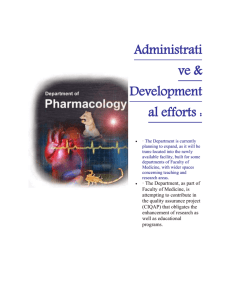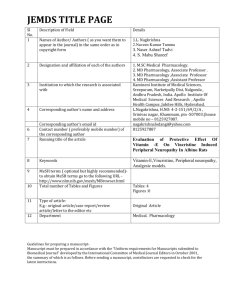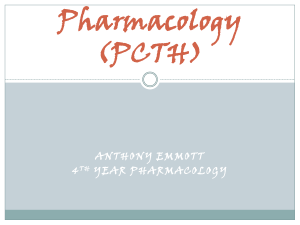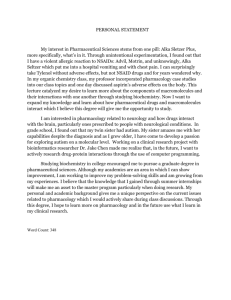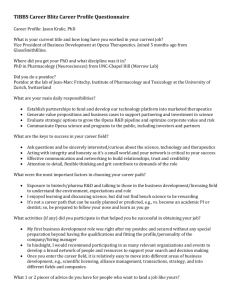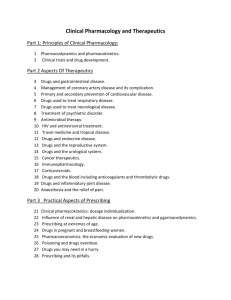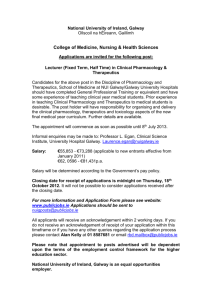MSc Experimental Pharmacology and Therapeutics
advertisement
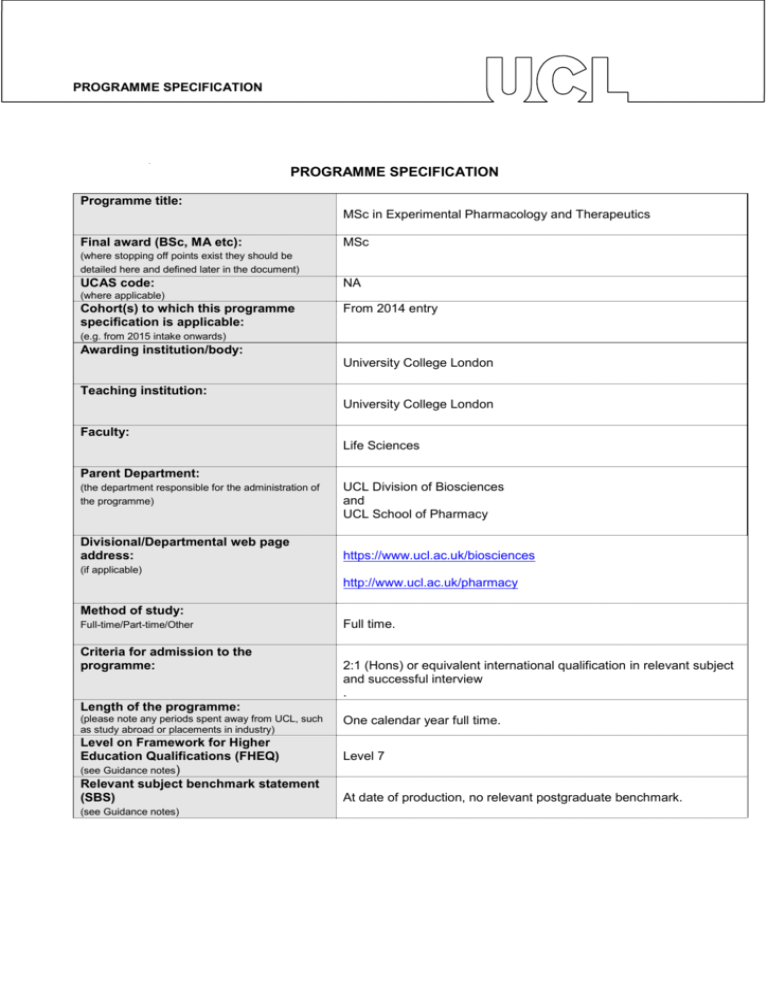
PROGRAMME SPECIFICATION PROGRAMME SPECIFICATION Programme title: MSc in Experimental Pharmacology and Therapeutics Final award (BSc, MA etc): MSc (where stopping off points exist they should be detailed here and defined later in the document) UCAS code: NA (where applicable) Cohort(s) to which this programme specification is applicable: From 2014 entry (e.g. from 2015 intake onwards) Awarding institution/body: University College London Teaching institution: University College London Faculty: Life Sciences Parent Department: (the department responsible for the administration of the programme) Divisional/Departmental web page address: UCL Division of Biosciences and UCL School of Pharmacy https://www.ucl.ac.uk/biosciences (if applicable) http://www.ucl.ac.uk/pharmacy Method of study: Full-time/Part-time/Other Criteria for admission to the programme: Full time. 2:1 (Hons) or equivalent international qualification in relevant subject and successful interview . Length of the programme: (please note any periods spent away from UCL, such as study abroad or placements in industry) Level on Framework for Higher Education Qualifications (FHEQ) (see Guidance notes) Relevant subject benchmark statement (SBS) (see Guidance notes) One calendar year full time. Level 7 At date of production, no relevant postgraduate benchmark. Brief outline of the structure of the programme and its assessment methods: (see guidance notes) Students are required to: Core: Investigative Pharmacology (30 credits over Term 1 & 2) Examination (60%); Techniques Poster (10%); Paper Presentation (10%); Drug Meta-Analysis project (20%) Core: Practice of Science (30 credits over Term 1 & 2) Poster 20%, Paper review (1,500 words) 20%; Figure Design 10%; Abstract presentation 40%; Project protocol 10% Core: Molecular Pharmacology (15 credits over Term 1) Exam (75%); Practical Reports (25%) Option: G-level module choice (either Term 1 or 2) Assessment will be based on individual G-level module Schemes of Award. Project: 90 credits (Term 1, 2 and 3) Student will be expected to: [1] Attend all scheduled lectures on the timetable. [2} Attend and present poster assignments as scheduled. [3] Attend and present journal club/paper review assignments. [4] Complete a research project. Assessment is by a dissertation and by viva voce. Board of Examiners: In the event of failure of <25% of the components of the programme e.g. failure of coursework or failure of examinations, re-sit examinations/assessments will be set and administered in the department. (Note: the maximum number of attempts at any assessment will remain at 2) Name of Board of Examiners: MSc in Experimental Pharmacology and Therapeutics Professional body accreditation (if applicable): N/A Date of next scheduled accreditation visit: EDUCATIONAL AIMS OF THE PROGRAMME: This Programme aims to provide postgraduate study in Experimental Pharmacology and Therapeutics with an emphasis on current research. The goal is to allow students to learn about topical areas of Pharmacology and Therapeutics from scientists who are leaders in their field and to critically appraise current literature. In addition, students will carry out an original research project in a well-funded, internationally competitive laboratory, and learn to present their findings both, orally and in the form of essays and a dissertation. The programme aims to train postgraduate students primarily towards the subsequent completion of a PhD and/or a career in pharmacology research and drug development. However, the course will also provide an excellent training in areas requiring critical appraisal of complex data transferable to other disciplines. PROGRAMME OUTCOMES: The programme provides opportunities for students to develop and demonstrate knowledge and understanding, qualities, skills and other attributes in the following areas: A: Knowledge and understanding Knowledge and understanding of: (1) Theoretical basis and traditional and advanced experimental approaches in pharmacology. (2) Quantitative principles that underlie the study of the action of drugs at receptors beginning with the physicochemical principles which underlie drugreceptor interactions. The molecular nature of receptors is considered in detail and a critical and quantitative approach to the analysis and interpretation of pharmacological data is developed. Teaching/learning methods and strategies: Lectures and practicals given by active, international class researchers in their field of pharmacology and therapeutics specialisation. Students will be required to attend all classes, study extensively on their own and, on the core courses mentioned above and one optional module, prepare assessed coursework and a research thesis. (3) Written and verbal communication of science, reference retrieval and management; abstract writing; poster preparation; graphical processing; image preparation for publication; writing a scientific paper; and giving a research talk. (4) Recent developments in therapeutics, drug discovery and drug development. (5) [Depending on the optional module selected] Neuropharmacology Receptor Mechanisms Immunopharmacology Psychopharmacology Synaptic Pharmacology CNS Pharmacology & Disorders Advanced Cardiovascular Pharmacology CNS Drugs of Abuse Epileptic Disorders Drug discovery and Clinical Development New Drug Targets in the CNS Modern Aspects of Drug Discovery Assessment: Timed examinations, take-home essays, poster presentations, production and oral examination of a dissertation on original research carried out by the student under the supervision of an active, international class researcher. B: Skills and other attributes Intellectual (thinking) skills: Ability to disseminate complex data and concepts, critical thinking, problem solving, creativity. Practical skills (able to): (1) In-depth understanding and application of classical and contemporary pharmacological and therapeutic techniques. . (2) Literature search-based data acquisition and analysis. Teaching/learning methods and strategies: Intellectual skills are developed throughout the course. Students are also required to present current pharmacology research to the other students with discussion aided by either a programme tutor or other contributor to the programme. Assessment: Students abilities to critically evaluate data will assessed summatively through poster presentations, paper reviews, report writing associated with specific modules and the project dissertation. C: Skills and other attributes Teaching/learning methods and strategies: (1) Students will undertake an almost entirely practicalbased module in Experimental Pharmacology as core. Techniques taught will include those developed at the host institution and others currently employed in pharmacological and therapeutic research. (2) Students will use data-mining software to acquire information on a selected drug and develop a report on its therapeutic impact. Assessment: (1) Students will sit an examination paper structured to assess the students’ analytical skill in light of the techniques they have gained experience with. Additionally, students will present a “Techniques Poster” in an assigned methodology. Further, as part of this Experimental Pharmacology module component of the programme, students will give an oral presentation reviewing a recent paper in the field. (2) Students will submit a concise written report on meta-analysis of the drug assigned to them. D: Skills and other attributes Practical skills (able to): (1) Manage and design a project, manage time efficiently, learn techniques and methodologies in current pharmacology/therapeutics research. (2) Presentation of ideas, concepts and original research in a clear and concise manner. Teaching/learning methods and strategies: The students are required to approach a supervisor in a field of pharmacology or therapeutics research that they are interested in, negotiate their entry into that lab to complete a project in a limited timeframe, present their findings orally and complete a written research report in the form of a dissertation. Assessment: The successful completion of a research project requires these skills. Therefore, the completion of an oral examination and production of a dissertation on original research carried out by the student indirectly assesses (1) and directly assesses (2). E: Skills and other attributes Transferable skills (able to): (1) Effective communication, oral/visual presentation. (2) Active listening, understanding/tolerance of others, groupwork/teamwork, self awareness/assessment, peer assessment, initiative/proactive approach, Independence and leadership, Teaching/learning methods and strategies: (1) Students will learn to present current pharmacology and therapeutics research to their peers and teaching/research staff. The students will also understand the process of engaging scientific colleagues as part of their approach to perspective supervisors to secure a project of interest to them in an area relevant to the programme remit. (2) These skills will be garnered in some respect in all of the modules constituting the programme but, in particular, honed in the Experimental Pharmacology module where students will work as teams, and under the challenge of the research environment offered by laboratory hosting their project. Assessment: (1) is assessed through the production and oral examination of a dissertation on original research carried out by the student under the supervision of an active, international class researcher. (2) is not formally assessed, however, during oral presentations, all students will be present and mutually exchange both oral and written review, in addition obtaining feedback from module tutors. The following reference points were used in designing the programme: the Framework for Higher Education Qualifications: (http://www.qaa.ac.uk/en/Publications/Documents/qualifications-frameworks.pdf); the relevant Subject Benchmark Statements: (http://www.qaa.ac.uk/assuring-standards-and-quality/the-quality-code/subject-benchmark-statements); the programme specifications for UCL degree programmes in relevant subjects (where applicable); UCL teaching and learning policies; staff research. Please note: This specification provides a concise summary of the main features of the programme and the learning outcomes that a typical student might reasonably be expected to achieve and demonstrate if he/she takes full advantage of the learning opportunities that are provided. More detailed information on the learning outcomes, content and teaching, learning and assessment methods of each course unit/module can be found in the departmental course handbook. The accuracy of the information contained in this document is reviewed annually by UCL and may be checked by the Quality Assurance Agency. Programme Organiser(s) Dr Jasmina Jovanovic (Department of Pharmacology, Name(s): UCL School of Pharmacy) Date of Production: Dr Talvinder Sihra (Neuroscience, Physiology and Pharmacology, UCL Division of Biosciences) 31st May 2013 Date of Review: June 2015 Date approved by Chair of Departmental Teaching Committee: Date approved by Faculty Teaching Committee June 2015 June 2015

